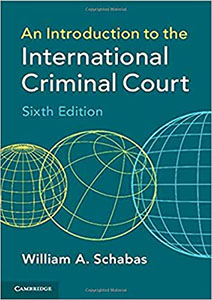
An Introduction to the International Criminal Court
International LawLJ HowardBy William Schabas (Cambridge UP 4th ed 2011)
Reviewed By LJ Howard, 31 March, 2021
William Schabas, a Canadian lawyer by training, is a leading authority on international criminal law, particularly on three of the four international crimes provided for in the Rome Statute of the International Criminal Court (1998) (Rome (1998)) - war crimes, crimes against humanity, and genocide. Notably, provisions for the fourth constituent crime, aggression, came into force 15 December 2017 following longstanding conference diplomacy at the Assembly of States Parties of the Coalition for the International Criminal Court (CICC). This latter development represents one of the more significant milestones in the entire progressive development of international law.
Usefully, Schabas is a gifted writer who reduces international criminal law, a topic some readers might find dry, into pleasant and informative narrative. This attribute makes his research, An Introduction to the International Criminal Court easy and practical reading. Any member of civil society reading Schabas’ work will further understand how the International Criminal Court (ICC) introduces accountability into the international order of sovereign powers and hence becomes an essential instrument of the 21st century model of international peace and security.
Other authorities have researched more so provisions of international criminal law itself and its elements. Illustratively, another Canadian, Darryl Robinson, who teaches at Queen’s University, collaborated with Robert Cryer, Håkan Friman, and Elizabeth Wilmshurt to author An Introduction to International Criminal Law and Procedure (Cambridge UP 2007). This is likely a more fluid read than International Criminal Law (Oxford UP 2nd ed 2008), authored by the late Judge Antonio Cassese. Regardless, both these volumes work very well to set up and complement Schabas’ research into the mechanics and intrigue of the Court.
The ICC is a judicial forum whose stand up is credited in part to another Canadian jurist, Philippe Kirsch, who served as a judge and its first president (2003-2009). Yet another Canadian, Louise Arbour, also served with distinction in international law. She was Chief prosecutor at the International Criminal Tribunals for Yugoslavia and Rwanda (respectively, ICTY and ICTR) from 1996 to 1999. Both fora are ad hoc tribunals stood up pursuant to the UN Security Council’s acting under Chapter VII Resolutions, whereas the ICC is an international treaty-based regime pursuant to Rome (1998).
Schabas’ research covers 11 chapters over 500 pages. Illustratively, he analyses and explains in very clear terms (i) the how and the why the ICC evolved; (ii) the unique arrangement of ‘complementarity’ that enables the ICC to exercise its power – its jurisdiction – over sovereign states; (iii) the ‘Negotiated Relationship Agreement between the International Criminal Court and the United Nations’ concerning the deferral and referral of certain situations (cases) between the ICC and the UN Security Council. This instrument assists in navigating the political sensitivities in the potentially conflicting jurisdiction of the two underlying international treaty-based regimes, and may test the relevance of the supremacy clause of the UN Charter, Art 103.
Schabas’ research does not expressly analyse the state legal practice of certain states. Notably, the People’s Republic of China, the Russian Federation or the United States are permanent members of the UN Security Council, and rank among states with the greatest wealth, most lethal arsenals of military force and most powerful projection in diplomacy, yet none of whom has ratified Rome (2000). Interestingly, the United States signed Rome (1998) but later advised it will not ratify the instrument and has vociferously objected to the ICC. Recently (2019), the US denied entry visas to staff of the ICC intending to brief the UN at its New York headquarters, as the ICC customarily does, conduct some consider un-statesman-like. Yet, the US has provided for some elements of international crimes in its national legislation and holds Observer Status at the CICC.
In sum, Schabas’s research provides readers with a very well-structured and clearly expressed understanding of international law against which to assess states’ practice, be it in good form or poor.
William Schabas, An Introduction to the International Criminal Court is available on Amazon at https://www.amazon.ca/Introduction-International-Criminal-Court/dp/1108727360
